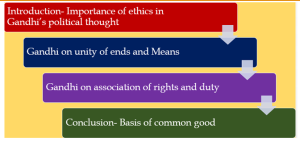Ques. Examine the unity of Ends and Means and idea of rights and duties reflected in Gandhi’s thought.
Answer
- Unlike Machiavelli or Kautilya, who adopted an amoral approach and sought to detach means from the end, Gandhi’s socio-political thought follows in the footsteps of Greek thinkers like Plato and Aristotle where politics was inextricably linked to ethics.
- This morality in socio-political thought is viewed both in the unity of ends and means as well as association between rights and duties. From Utilitarians to Marxists, means have often been belittled for the sake of ends.
- However, Gandhi argues, “The means may be likened to a seed, the end to a tree; and there is just the same inviolable connection between the means and the end as there is between the seed and the tree.” Gandhi’s unity of ends and means was contingent upon the connection between satya and ahimsa and tolerance and civility.
- He evolved his political and social ethic in terms of a theory of action which was justified only by reference to satya and ahimsa, which are good in themselves.
- According to G. Tendulkar, Gandhi explicitly rejected the doctrine that the end justifies the means,and went so far as to assert that a moral means is almost an end in itselfbecause virtue is its own reward.
- According to G.N. Sarma, the concept of duty was at the core of Gandhi’s teaching and philosophy. Based on this belief in karma and dharma, Gandhi rejects the classical liberal theory which is based on individual rights. Rather he takes the route of positive liberals wherein rights flow out of the performance of duty– ‘real rights as a result of performance of duty’
- The crux of Swaraj and Satyagraha, for Gandhi, is in deciphering what one’s duty is. The concept of duty, for Gandhi, is derived from the idea of dispassionate action which the Bhagavad Gita advocates.
- While rejecting liberalism’s right based individualism, Gandhi does accept its core values of human equality and moral worth.
- Based on the same, he supports the basic rights of those at the margins of society, namely women, untouchables and the vulnerable, who have been objects of domination and humiliation with a corresponding duty on others to ensure their dignity.
- For Gandhi any discourse of rights would have to focus on how persons are treated. He pays attention to the role of institutions or the way resources affect choices available for individuals, comparable to later views of scholars like Rawls, Dworkins and Sen.
- Importantly for Gandhi, individuals are equal members of a harmonious and interdependent cosmosrather than abstracted selves, necessitating an association with others based on mutual respect and cooperation that persons become complete or achieve good.
- The community ought to be one that is open and tolerant of diverse conceptions of good and that its institutional practices do not hinder the pursuit of their good by ordinary persons.


